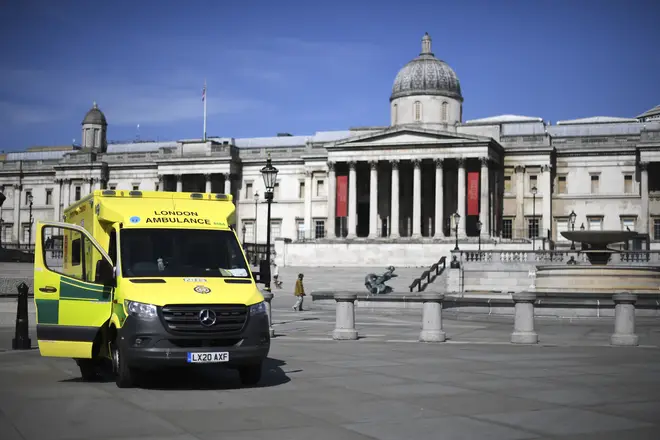
James O'Brien 10am - 1pm
14 April 2020, 14:34

The economy could shrink by up to 35 per cent and two million jobs could be lost due to the coronavirus outbreak, forecasters have warned.
The Office for Budget Responsibility said the UK unemployment rate, which is currently 3.9 per cent, could more than double to 10 per cent.
Experts at the independent group said unemployment is expected to hit 3.4 million if the lockdown lasts three months followed by a partial lifting for three months.
Follow our coronavirus liveblog here
It said: "As with GDP, the rise in unemployment is likely to be very fast, as the sharp rise in new claims for UC already attests.
"Indeed, we might expect almost all the rise to happen within the first month."
However, the OBR said on its new prediction, GDP will then jump 25% in the third quarter and a further 20% in the final three months of 2020 - meaning the economy should recover by the end of the year.
The OBR added: "The net effect of the coronavirus impact and the policy response is likely to be a sharp (but largely temporary) increase in government borrowing that will leave public sector net debt permanently higher as a share of GDP.
"However, the longer the period of economic disruption lasts, the more likely it is that the economy's future potential output will be 'scarred' (thanks to business failures, cancelled investments and the unemployed becoming disconnected from the labour market).
"If that happens, the budget deficit would reverse less of its temporary rise as economic activity recovers, leaving the Government to confront a larger structural deficit and not just higher debt."
Our three-month lockdown scenario sees GDP fall by a third, but with a quick recovery as the restrictions are lifted. #OBRcovidscenario pic.twitter.com/raiu16Q8qV
— Office for Budget Responsibility (@OBR_UK) April 14, 2020
The forecaster also stated that the UK's budget deficit could hit £273 billion over the next tax year - five times its previous estimate and equivalent to 14 per cent of gross domestic product.
This would be the biggest deficit since World War Two.
It comes as Foreign Secretary Dominic Raab suggested the UK could remain in lockdown for another three weeks.
The OBR also said public sector net debt could exceed 100% of gross domestic product during the 2020/21 financial year but end it at around 95% of GDP.
Before the crisis, the OBR had forecast debt would be 77% of GDP in 2020/21.
Listen & subscribe: Global Player | Apple Podcasts | Google Podcasts | Spotify
It means that the UK deficit would rise to 14% of GDP, and UK national debt would rise to 100% of GDP.
It would mean that this is the largest quarterly contraction since at least 1908, bigger than during The Spanish Influenza, the financial crisis, WW1 or WW2.
The OBR added that, on its new prediction, GDP will then jump 25% in the third quarter and a further 20% in the final three months of 2020.
Public sector net borrowing is also expected to increase by £218 billion this year, compared with March forecasts, hitting £273 billion, or 14% of GDP.
The OBR said: "The sharp rise in borrowing this year largely reflects the impact of economic disruption on receipts (with smaller effects from policy measures like the business rates holidays) and policy measures that add to public spending (with smaller effects from higher unemployment)."

However, the OBR scenario sees GDP recovering sharply in the third and fourth quarters of the year, although overall there would be a decline of 13% for 2020.
The OBR said: “The longer the period of economic disruption lasts, the more likely it is that the economy’s future potential output will be scarred.”
“However, the immediate cost of the government’s actions may be high, but we can be confident that the cost of inaction would ultimately have been much higher,” the OBR continued.
Responding to the figures in the OBR report, a Treasury spokesperson admitted the Government is working on the assumption that coronavirus will have a "very significant hit" on the economy.
Chancellor Rishi Sunak said: "Firstly, it's clear this will have a very significant impact on our economy - as it will for economies around the world. It's important that we're honest about that.
"People should know that there is hardship ahead and we won't be able to protect every job or every business, as I've said.
"Second, the report makes clear that the unprecedented actions we've taken will help to mitigate the impact of the virus on our economy and that if we hadn't done these thing it would mean that things were a lot worse, for example the impact on unemployment."
Anneliese Dodds MP, Labour’s Shadow Chancellor, responding to OBR figures, said: “Behind these very concerning figures lie many businesses which have gone bust and many people who have lost their jobs.
“Labour has been working constructively with Government on its economic support package. It is clear that additional action needs to be taken to increase the take-up of the different measures. We have called for urgent action in relation to the loans scheme in particular, as take-up is worryingly low.
“It is absolutely critical that government now does all it can to minimise the depth and length of the economic impact from necessary anti-Coronavirus measures.”